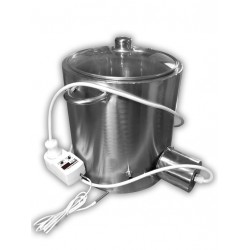Cheese makers
Cheese-Making Vessels
A cheese-making vessel is a container where all the cheese-making processes occur. This includes everything from milk pasteurization to the aging of special cheese varieties. With an electric setup, you can produce dairy products for home use or for sale.
Cheese-Making
Humanity has been creating dairy products for centuries. Technologies have evolved and improved based on geography, customs, and technical progress. Today, there are hundreds of types of cheese, but the cheese-making process can be summarized in a few key stages. These stages are:
Features of the Construction
Modern cheese-making machines are electric and automated devices. The vessel is designed not only to heat raw milk but also to maintain a specific temperature for cheese maturation. Therefore, food-grade stainless steel, with a thickness of at least 1 mm, is used in their construction. Each unit can maintain temperatures ranging from 0 to 100 degrees Celsius.
The size of the cheese maker depends on its volume. For those looking to buy a small cheese-making machine, the capacity would be 10 liters, with a diameter of 26 cm and a weight of 6 kg. Larger vessels, with capacities of 15 and 18 liters, are suitable for small-scale craft production.
A home cheese maker typically has a power of 2 kW and operates on a 220 V power supply. The design must be airtight to maintain a consistent temperature, which is crucial for following proper dairy production techniques. Any deviation from the recipe can not only spoil the raw materials but also pose health risks.
Purchase a Cheese-Maker from Uteho
Uteho manufactures high-quality cheese-making machines using premium stainless steel, specifically AISI 304. This grade of austenitic low-carbon steel is resistant to acids and can withstand short-term exposure to temperatures up to 900 degrees Celsius. The smallest cheese maker starts at 5,000 UAH.
Payment options include:







